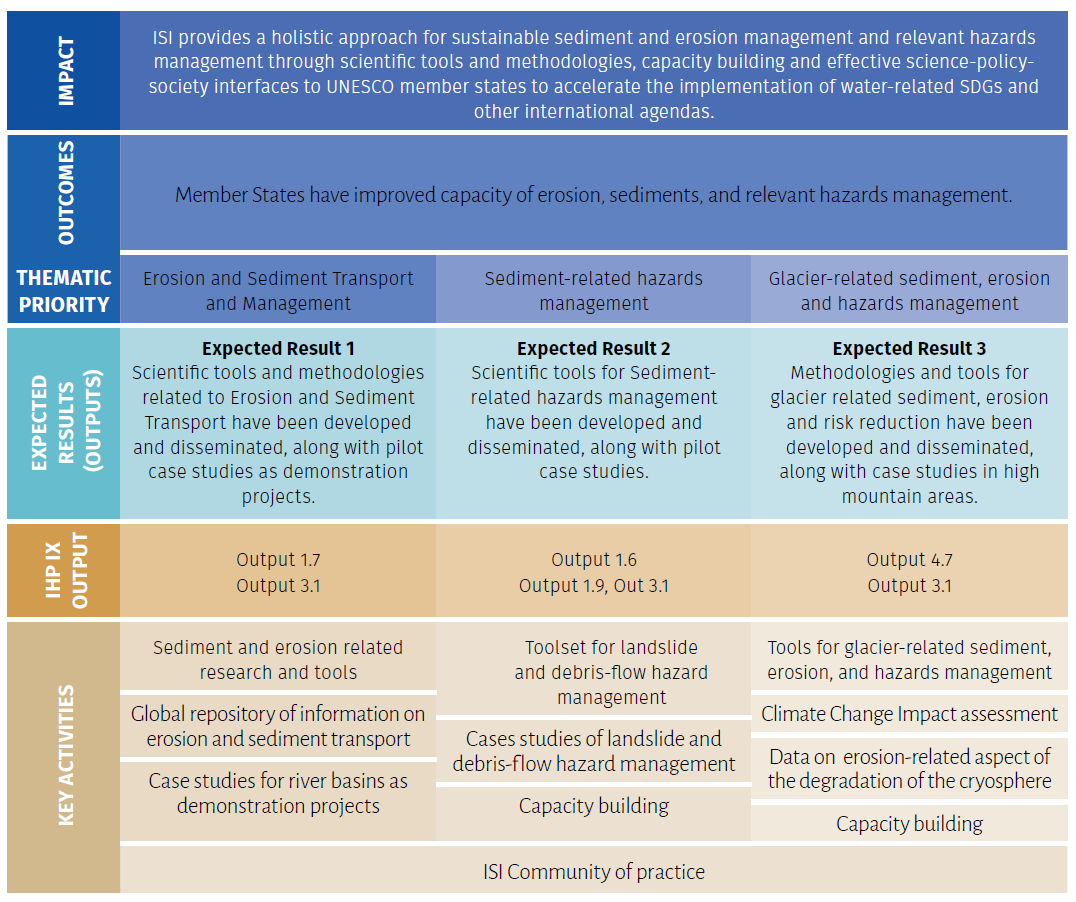OBJECTIVES OF THE ISI PROGRAMME
Sediment and erosion have significant impacts on the environment, ecosystems, and human activities. For example, sediment and erosion can lead to the degradation of aquatic habitats, including rivers, lakes, and coastal areas. Excessive sedimentation can destroy important habitats for aquatic plants and animals, disrupting the balance of ecosystems. Sediment carried by erosion can also negatively affect water quality. Excessive sedimentation can lead to increased turbidity, reducing light penetration and disrupting photosynthesis for aquatic plants. Sediment can also transport pollutants such as nutrients, heavy metals, and pesticides, which can harm aquatic life and contaminate water sources both from freshwater systems to seas and oceans.
Furthermore, climate change, by intensifying extreme weather events like heavy rainfall, storms, and flash
floods, and causing sea-level rise, increases the risk of disasters such as landslides, gully erosion, and coastal erosion. Additionally, glaciers play a significant role in sediment transport and erosion, shaping landscapes through various processes, which can lead to the formation of various landforms, including moraines, drumlins, and fjords.
Based on the impacts of sediment and erosion, UNESCO ISI flagship prioritizes three thematic areas as
presented in the ISI Theory of Change (Figure 1):
1. Erosion and Sediment Transport and Management: this thematic priority mainly builds on the earlier work of ISI in IHP Phase VIII. It will focus on understanding the processes of erosion and sediment transport in river systems and landscapes. Under this thematic area, the two pillars of work will be conducted: Hillslope Erosion and Sediment Supply, and Erosion and Sediment Transport in river basins.
2. Sediment-related Hazard Management: This thematic priority addresses sediment-related hazards, which encompass slope failures, debris flows, and landslides. The focus will be on effective sediment-related hazard management, with a specific emphasis on mitigating landslide and debris-flow hazards.
3. Glacier-related sediment, erosion and hazards management: glaciers play a significant role in sediment transport and erosion. Glacier- and permafrost-related hazards, such as, Glacial Lake Outburst Floods (GLOF), represent a continuous and growing threat to human lives and infrastructure in high mountain regions. Under this thematic priority, efforts will focus on research and knowledge of glacier erosion processes, cryosphere system vulnerability reduction, Glacial Lake Outburst Floods.
The objective of ISI is to increase awareness of erosion and sedimentation dynamics and sediment issues for the three thematic priorities in all spheres of water management by linking science with policy and management needs and supporting the global agenda for sustainable sediment management.
ISI also has the mission to organize and promote international information exchange and provide direct
access to policy makers in Member States while activating scientific and professional communities in all regions and countries concerned. ISI will promote the elaboration and monitoring of sediment data to develop appropriate methodologies, tools and procedures in sediment management.
This overall objective is also aligned with the priorities of the current IHP-IX phase, as well as the overall UNESCO-IHP mission, which concerns mobilizing scientific and policy-relevant expertise, knowledge and tools for informed decisions in addressing water challenges, as well as strengthening transdisciplinary water research by supporting research on methods for stakeholder involvement and knowledge integration.

 ISI STRATEGY A contribution to IHP IX.pdf ISI STRATEGY A contribution to IHP IX.pdf
|
|